Digital Narrative on Facilitating Mental Health Recovery - UOB
VerifiedAdded on 2022/09/17
|6
|1271
|17
Creative Assignment
AI Summary
This digital narrative examines the process of mental health recovery through the case study of Mr. Pumpin, a 35-year-old male diagnosed with anxiety and depression and admitted to an acute mental health unit. The narrative, created by a student, highlights the importance of a multidisciplinary team comprising psychiatrists, occupational therapists, healthcare assistants, and student nurses. It underscores the impact of depression on motivation and the need for a person-centered recovery model. The narrative details interventions such as gross motor activities, group activities, and relaxation techniques, while also emphasizing ethical considerations and the principles of social inclusion, empowerment, and strength-based approaches. References to relevant literature are included to support the narrative's content and provide a comprehensive understanding of mental health recovery practices. This assignment is a valuable resource for students studying mental health nursing, offering insights into practical strategies and theoretical frameworks for facilitating patient recovery.
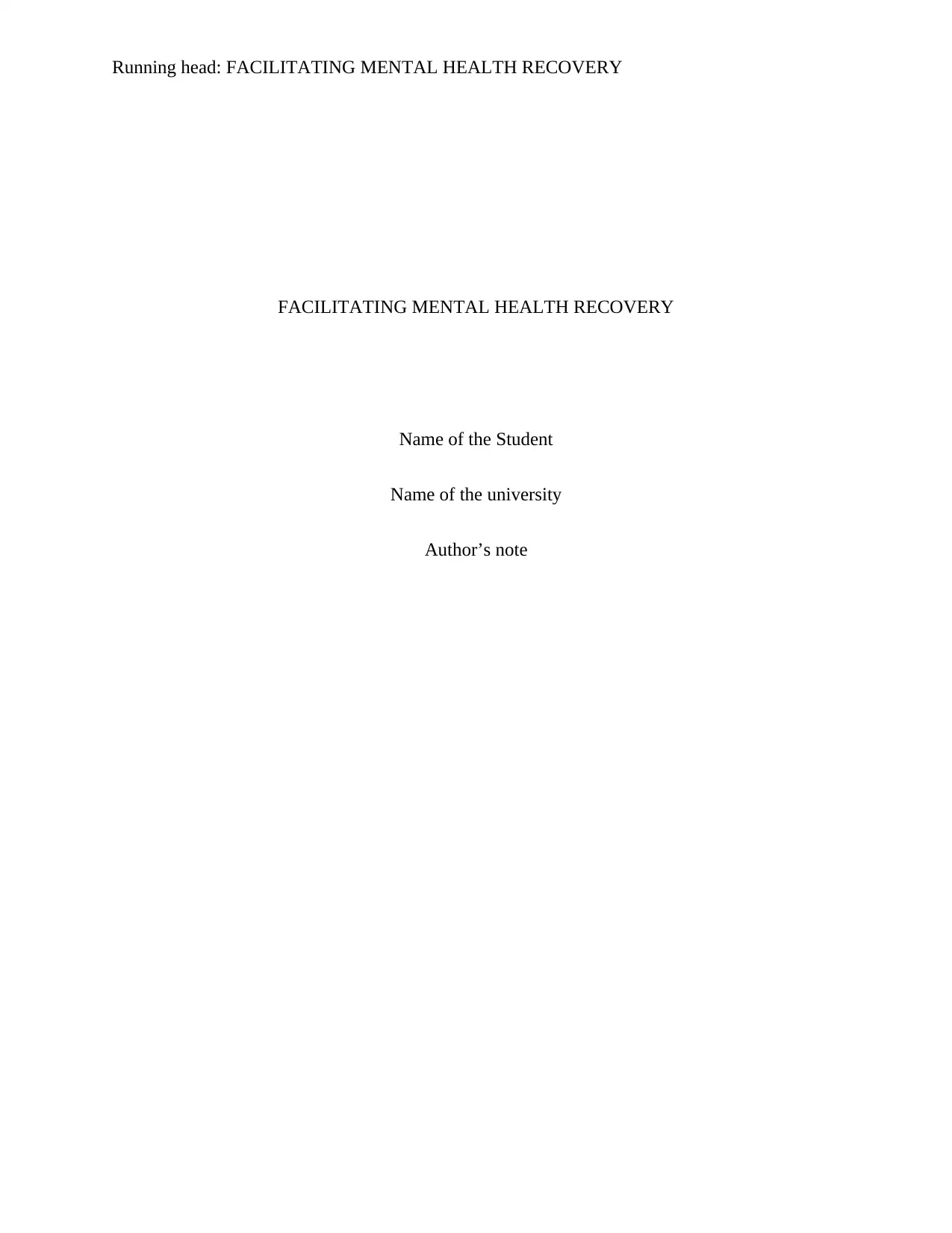
Running head: FACILITATING MENTAL HEALTH RECOVERY
FACILITATING MENTAL HEALTH RECOVERY
Name of the Student
Name of the university
Author’s note
FACILITATING MENTAL HEALTH RECOVERY
Name of the Student
Name of the university
Author’s note
Paraphrase This Document
Need a fresh take? Get an instant paraphrase of this document with our AI Paraphraser
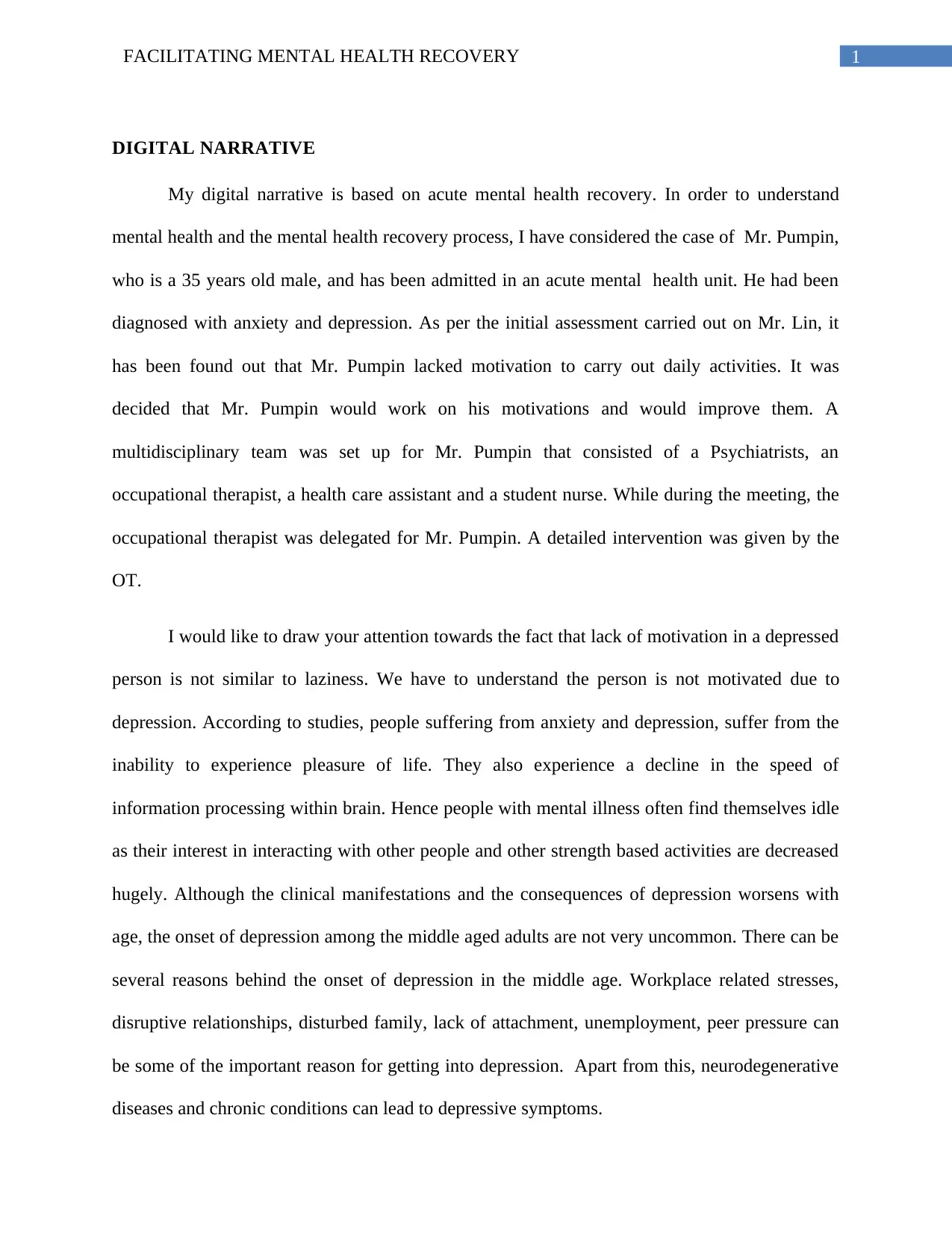
1FACILITATING MENTAL HEALTH RECOVERY
DIGITAL NARRATIVE
My digital narrative is based on acute mental health recovery. In order to understand
mental health and the mental health recovery process, I have considered the case of Mr. Pumpin,
who is a 35 years old male, and has been admitted in an acute mental health unit. He had been
diagnosed with anxiety and depression. As per the initial assessment carried out on Mr. Lin, it
has been found out that Mr. Pumpin lacked motivation to carry out daily activities. It was
decided that Mr. Pumpin would work on his motivations and would improve them. A
multidisciplinary team was set up for Mr. Pumpin that consisted of a Psychiatrists, an
occupational therapist, a health care assistant and a student nurse. While during the meeting, the
occupational therapist was delegated for Mr. Pumpin. A detailed intervention was given by the
OT.
I would like to draw your attention towards the fact that lack of motivation in a depressed
person is not similar to laziness. We have to understand the person is not motivated due to
depression. According to studies, people suffering from anxiety and depression, suffer from the
inability to experience pleasure of life. They also experience a decline in the speed of
information processing within brain. Hence people with mental illness often find themselves idle
as their interest in interacting with other people and other strength based activities are decreased
hugely. Although the clinical manifestations and the consequences of depression worsens with
age, the onset of depression among the middle aged adults are not very uncommon. There can be
several reasons behind the onset of depression in the middle age. Workplace related stresses,
disruptive relationships, disturbed family, lack of attachment, unemployment, peer pressure can
be some of the important reason for getting into depression. Apart from this, neurodegenerative
diseases and chronic conditions can lead to depressive symptoms.
DIGITAL NARRATIVE
My digital narrative is based on acute mental health recovery. In order to understand
mental health and the mental health recovery process, I have considered the case of Mr. Pumpin,
who is a 35 years old male, and has been admitted in an acute mental health unit. He had been
diagnosed with anxiety and depression. As per the initial assessment carried out on Mr. Lin, it
has been found out that Mr. Pumpin lacked motivation to carry out daily activities. It was
decided that Mr. Pumpin would work on his motivations and would improve them. A
multidisciplinary team was set up for Mr. Pumpin that consisted of a Psychiatrists, an
occupational therapist, a health care assistant and a student nurse. While during the meeting, the
occupational therapist was delegated for Mr. Pumpin. A detailed intervention was given by the
OT.
I would like to draw your attention towards the fact that lack of motivation in a depressed
person is not similar to laziness. We have to understand the person is not motivated due to
depression. According to studies, people suffering from anxiety and depression, suffer from the
inability to experience pleasure of life. They also experience a decline in the speed of
information processing within brain. Hence people with mental illness often find themselves idle
as their interest in interacting with other people and other strength based activities are decreased
hugely. Although the clinical manifestations and the consequences of depression worsens with
age, the onset of depression among the middle aged adults are not very uncommon. There can be
several reasons behind the onset of depression in the middle age. Workplace related stresses,
disruptive relationships, disturbed family, lack of attachment, unemployment, peer pressure can
be some of the important reason for getting into depression. Apart from this, neurodegenerative
diseases and chronic conditions can lead to depressive symptoms.
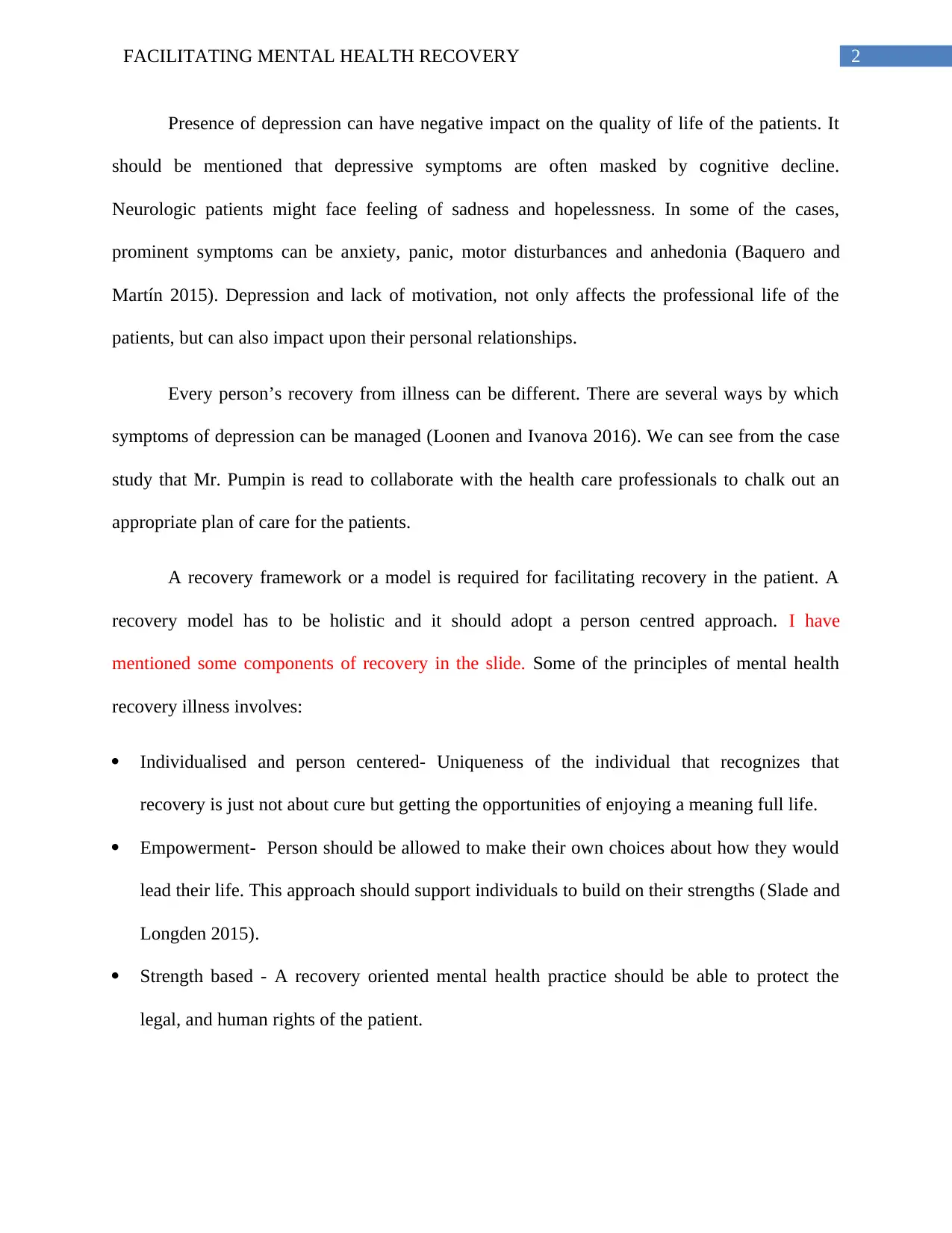
2FACILITATING MENTAL HEALTH RECOVERY
Presence of depression can have negative impact on the quality of life of the patients. It
should be mentioned that depressive symptoms are often masked by cognitive decline.
Neurologic patients might face feeling of sadness and hopelessness. In some of the cases,
prominent symptoms can be anxiety, panic, motor disturbances and anhedonia (Baquero and
Martín 2015). Depression and lack of motivation, not only affects the professional life of the
patients, but can also impact upon their personal relationships.
Every person’s recovery from illness can be different. There are several ways by which
symptoms of depression can be managed (Loonen and Ivanova 2016). We can see from the case
study that Mr. Pumpin is read to collaborate with the health care professionals to chalk out an
appropriate plan of care for the patients.
A recovery framework or a model is required for facilitating recovery in the patient. A
recovery model has to be holistic and it should adopt a person centred approach. I have
mentioned some components of recovery in the slide. Some of the principles of mental health
recovery illness involves:
Individualised and person centered- Uniqueness of the individual that recognizes that
recovery is just not about cure but getting the opportunities of enjoying a meaning full life.
Empowerment- Person should be allowed to make their own choices about how they would
lead their life. This approach should support individuals to build on their strengths (Slade and
Longden 2015).
Strength based - A recovery oriented mental health practice should be able to protect the
legal, and human rights of the patient.
Presence of depression can have negative impact on the quality of life of the patients. It
should be mentioned that depressive symptoms are often masked by cognitive decline.
Neurologic patients might face feeling of sadness and hopelessness. In some of the cases,
prominent symptoms can be anxiety, panic, motor disturbances and anhedonia (Baquero and
Martín 2015). Depression and lack of motivation, not only affects the professional life of the
patients, but can also impact upon their personal relationships.
Every person’s recovery from illness can be different. There are several ways by which
symptoms of depression can be managed (Loonen and Ivanova 2016). We can see from the case
study that Mr. Pumpin is read to collaborate with the health care professionals to chalk out an
appropriate plan of care for the patients.
A recovery framework or a model is required for facilitating recovery in the patient. A
recovery model has to be holistic and it should adopt a person centred approach. I have
mentioned some components of recovery in the slide. Some of the principles of mental health
recovery illness involves:
Individualised and person centered- Uniqueness of the individual that recognizes that
recovery is just not about cure but getting the opportunities of enjoying a meaning full life.
Empowerment- Person should be allowed to make their own choices about how they would
lead their life. This approach should support individuals to build on their strengths (Slade and
Longden 2015).
Strength based - A recovery oriented mental health practice should be able to protect the
legal, and human rights of the patient.
⊘ This is a preview!⊘
Do you want full access?
Subscribe today to unlock all pages.

Trusted by 1+ million students worldwide
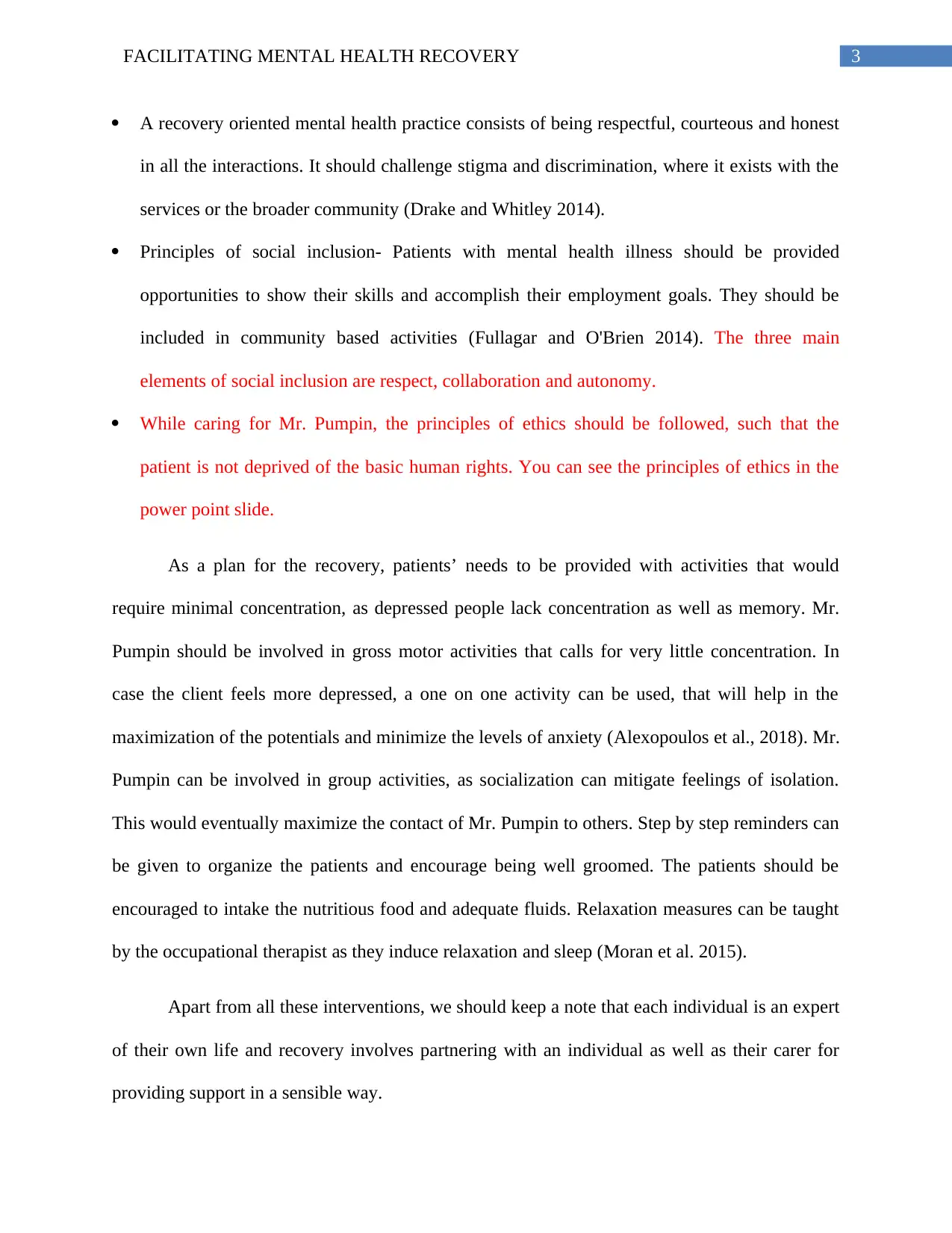
3FACILITATING MENTAL HEALTH RECOVERY
A recovery oriented mental health practice consists of being respectful, courteous and honest
in all the interactions. It should challenge stigma and discrimination, where it exists with the
services or the broader community (Drake and Whitley 2014).
Principles of social inclusion- Patients with mental health illness should be provided
opportunities to show their skills and accomplish their employment goals. They should be
included in community based activities (Fullagar and O'Brien 2014). The three main
elements of social inclusion are respect, collaboration and autonomy.
While caring for Mr. Pumpin, the principles of ethics should be followed, such that the
patient is not deprived of the basic human rights. You can see the principles of ethics in the
power point slide.
As a plan for the recovery, patients’ needs to be provided with activities that would
require minimal concentration, as depressed people lack concentration as well as memory. Mr.
Pumpin should be involved in gross motor activities that calls for very little concentration. In
case the client feels more depressed, a one on one activity can be used, that will help in the
maximization of the potentials and minimize the levels of anxiety (Alexopoulos et al., 2018). Mr.
Pumpin can be involved in group activities, as socialization can mitigate feelings of isolation.
This would eventually maximize the contact of Mr. Pumpin to others. Step by step reminders can
be given to organize the patients and encourage being well groomed. The patients should be
encouraged to intake the nutritious food and adequate fluids. Relaxation measures can be taught
by the occupational therapist as they induce relaxation and sleep (Moran et al. 2015).
Apart from all these interventions, we should keep a note that each individual is an expert
of their own life and recovery involves partnering with an individual as well as their carer for
providing support in a sensible way.
A recovery oriented mental health practice consists of being respectful, courteous and honest
in all the interactions. It should challenge stigma and discrimination, where it exists with the
services or the broader community (Drake and Whitley 2014).
Principles of social inclusion- Patients with mental health illness should be provided
opportunities to show their skills and accomplish their employment goals. They should be
included in community based activities (Fullagar and O'Brien 2014). The three main
elements of social inclusion are respect, collaboration and autonomy.
While caring for Mr. Pumpin, the principles of ethics should be followed, such that the
patient is not deprived of the basic human rights. You can see the principles of ethics in the
power point slide.
As a plan for the recovery, patients’ needs to be provided with activities that would
require minimal concentration, as depressed people lack concentration as well as memory. Mr.
Pumpin should be involved in gross motor activities that calls for very little concentration. In
case the client feels more depressed, a one on one activity can be used, that will help in the
maximization of the potentials and minimize the levels of anxiety (Alexopoulos et al., 2018). Mr.
Pumpin can be involved in group activities, as socialization can mitigate feelings of isolation.
This would eventually maximize the contact of Mr. Pumpin to others. Step by step reminders can
be given to organize the patients and encourage being well groomed. The patients should be
encouraged to intake the nutritious food and adequate fluids. Relaxation measures can be taught
by the occupational therapist as they induce relaxation and sleep (Moran et al. 2015).
Apart from all these interventions, we should keep a note that each individual is an expert
of their own life and recovery involves partnering with an individual as well as their carer for
providing support in a sensible way.
Paraphrase This Document
Need a fresh take? Get an instant paraphrase of this document with our AI Paraphraser

4FACILITATING MENTAL HEALTH RECOVERY
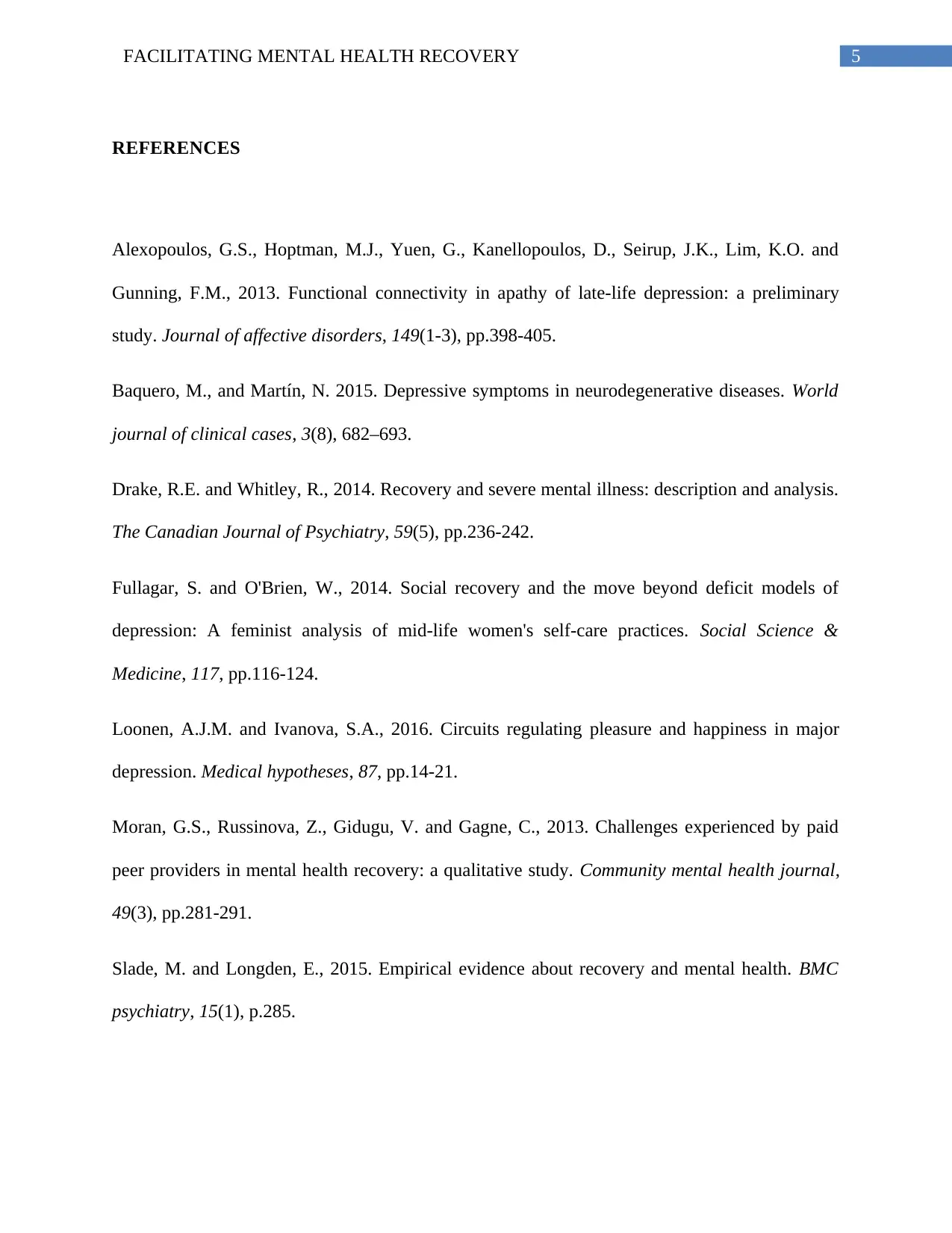
5FACILITATING MENTAL HEALTH RECOVERY
REFERENCES
Alexopoulos, G.S., Hoptman, M.J., Yuen, G., Kanellopoulos, D., Seirup, J.K., Lim, K.O. and
Gunning, F.M., 2013. Functional connectivity in apathy of late-life depression: a preliminary
study. Journal of affective disorders, 149(1-3), pp.398-405.
Baquero, M., and Martín, N. 2015. Depressive symptoms in neurodegenerative diseases. World
journal of clinical cases, 3(8), 682–693.
Drake, R.E. and Whitley, R., 2014. Recovery and severe mental illness: description and analysis.
The Canadian Journal of Psychiatry, 59(5), pp.236-242.
Fullagar, S. and O'Brien, W., 2014. Social recovery and the move beyond deficit models of
depression: A feminist analysis of mid-life women's self-care practices. Social Science &
Medicine, 117, pp.116-124.
Loonen, A.J.M. and Ivanova, S.A., 2016. Circuits regulating pleasure and happiness in major
depression. Medical hypotheses, 87, pp.14-21.
Moran, G.S., Russinova, Z., Gidugu, V. and Gagne, C., 2013. Challenges experienced by paid
peer providers in mental health recovery: a qualitative study. Community mental health journal,
49(3), pp.281-291.
Slade, M. and Longden, E., 2015. Empirical evidence about recovery and mental health. BMC
psychiatry, 15(1), p.285.
REFERENCES
Alexopoulos, G.S., Hoptman, M.J., Yuen, G., Kanellopoulos, D., Seirup, J.K., Lim, K.O. and
Gunning, F.M., 2013. Functional connectivity in apathy of late-life depression: a preliminary
study. Journal of affective disorders, 149(1-3), pp.398-405.
Baquero, M., and Martín, N. 2015. Depressive symptoms in neurodegenerative diseases. World
journal of clinical cases, 3(8), 682–693.
Drake, R.E. and Whitley, R., 2014. Recovery and severe mental illness: description and analysis.
The Canadian Journal of Psychiatry, 59(5), pp.236-242.
Fullagar, S. and O'Brien, W., 2014. Social recovery and the move beyond deficit models of
depression: A feminist analysis of mid-life women's self-care practices. Social Science &
Medicine, 117, pp.116-124.
Loonen, A.J.M. and Ivanova, S.A., 2016. Circuits regulating pleasure and happiness in major
depression. Medical hypotheses, 87, pp.14-21.
Moran, G.S., Russinova, Z., Gidugu, V. and Gagne, C., 2013. Challenges experienced by paid
peer providers in mental health recovery: a qualitative study. Community mental health journal,
49(3), pp.281-291.
Slade, M. and Longden, E., 2015. Empirical evidence about recovery and mental health. BMC
psychiatry, 15(1), p.285.
⊘ This is a preview!⊘
Do you want full access?
Subscribe today to unlock all pages.

Trusted by 1+ million students worldwide
1 out of 6
Related Documents
Your All-in-One AI-Powered Toolkit for Academic Success.
+13062052269
info@desklib.com
Available 24*7 on WhatsApp / Email
![[object Object]](/_next/static/media/star-bottom.7253800d.svg)
Unlock your academic potential
Copyright © 2020–2026 A2Z Services. All Rights Reserved. Developed and managed by ZUCOL.





